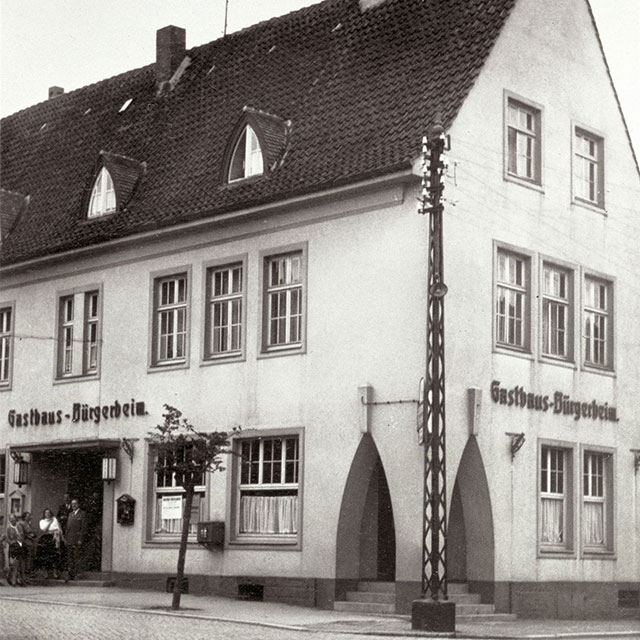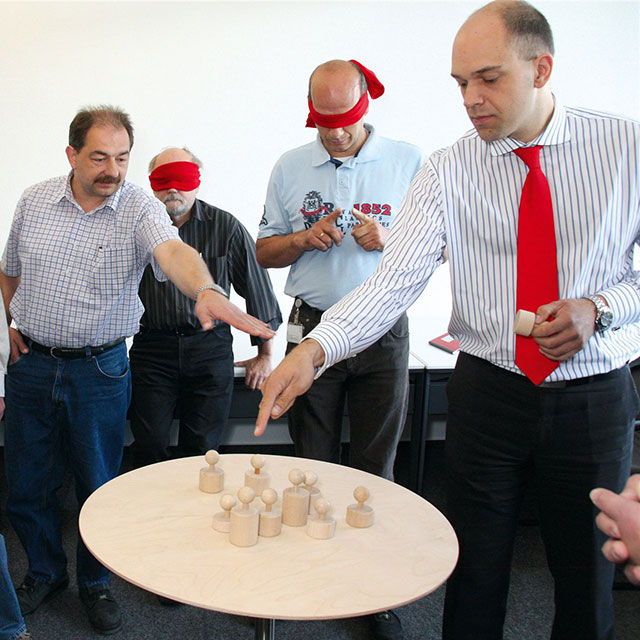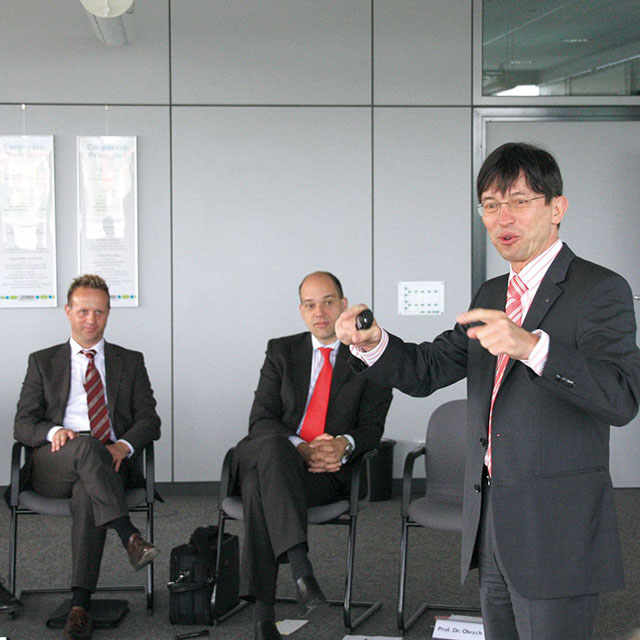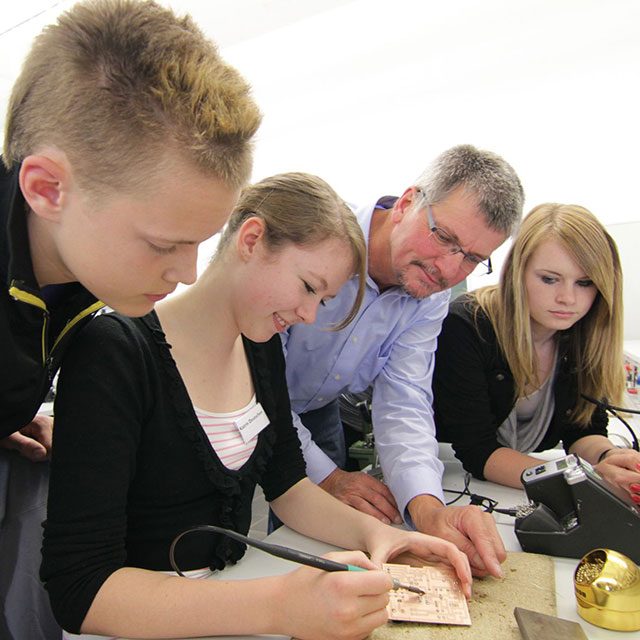Phoenix Contact
“It took us 84 years to reach an annual turnover of 1 billion Euros. Now we have increased our turnover to 1.5 billion—in only four years,” says managing director for personnel, computer science and law, Prof. Dr. Gunther Olesch, who enthusiastically welcomed us with a firm handshake.
The company that Gunther Olesch is working for is not widely known, and neither is its success story throughout the past few years. A family-run supplier from the North Rhine-Westphalia, Blomberg is one of the most attractive employers in Germany. Among many other awards for its personnel policy, Phoenix Contact just won the world-renowned innovation technology prize, the Hermes Award of the Hannover Expo.
Blomberg, with its 16,000 inhabitants, is not exactly centrally located. From the capital of Lower Saxony Hannover, it takes 70 minutes by S-Bahn (train) and another ten minutes by taxi to reach the headquarters of Phoenix Contact. Despite the decentralized location and—for the average consumer—unknown corporate name of the family-operated electronic and automation supplier, the company has no trouble filling vacancies. Every month, the company receives approximately 800 applications.
Anyone who starts at Phoenix Contact usually remains loyal to the company in the long term. The turnover rate among employees is 0.6 percent. (The national average is 7.4 percent, a staggering ten times higher.) In a manufacturing industry with a three-layered shift system, the sickness rate is 3.1 percent, surprisingly well below the nationwide 7.1 percent.
To understand what makes the company different, you have to listen to Gunther Olesch and his staff for a few minutes. “Our corporate culture has a strong focus on the team. The people who work here are pleased.”
TRUST IN AND FOCUS ON THE PEOPLE
Around the turn of the millennium, the management team met with the managing partner Klaus Eisert to consider the long-term development of the company. It quickly became apparent: If Phoenix Contact wants to remain independent in the global market with competitors like Siemens or Bosch, the company has to grow significantly.
To achieve this growth, the Blomberg strategists developed the “Trust Concept” in 2007. The aim of this concept is as follows. In 2020, Phoenix Contact shall be known as a trustworthy company within the industry. This approach—according to the Blomberg strategists—ensures a long-term partnership with customers and sustainable growth.
When considering the Trust Concept, an intermediate target was identified. This long-term development was only possible with the inclusion of staff. Only this approach could ensure “excellence in leadership and communication.” To the Blomberg strategists it was clear—if confidence is something the company wants to be known for, confidence must first be strengthened in its own team. Only if that were achieved would the company be able to gain this trust from the outside. Through constant and increasing customer feedback, Phoenix Contact realized: Its own employees are a fundamental differentiator over the competition. The interaction with Phoenix Contact staff was well received by the customers. Feedback revealed that personal contact with the company created a positive atmosphere.
To primarily develop executive staff and culture, employee surveys were evaluated. They were assessed for individual divisions and combined with the results of 360-degree feedback. From this individual measure derives a broad range of external and internal coaching and training opportunities. The array is very diverse, with the HR department providing extensive support. To best support the new concept in the company, so-called trust facilitators were anchored in every department. These employees have been with the department for a long time. Only now did they receive the additional responsibility of supporting the Trust Process “out of the system.” They came to be the principal focal points for the changing process: the contact persons for colleagues, consultants of the Head Unit and middlemen between managers, employees, human resources, and head management. A total of 30 facilitators also merged into an independent network which is in continuous exchange with each other and also takes on the role of additional multiplier for internal communication.
“These colleagues know that what is handed down from the top will be received at the bottom. As they are not part of the HR department, they are supposed to collect subjective opinions and deliver them back to the top of the company. They are our seismographs,” explains Yamilet Lucia Popp of Human Resources Development. “As a result we see how we can do even better.”
For example, with the help of suggestions from the network of facilitators, management began to look for ways to more directly communicate with staff. The solution: senior management offers retrievable video podcasts in multiple languages (and in sign language) of daily and strategic events to its staff. It does this several times per annum. In one of these video podcasts, the head of HR Development discusses with HR management the results of the latest employee surveys and their importance to the company.
COMMUNICATION AND CONNECTION
Jeanie Duck, one of the global Change-Pioneers, recently summarized the findings of her more than 30 years of work. She writes, “One of the essential ingredients for any company that goes through a phase of change is ‘Stay Connected.’” In 2009, as the global economic rollercoaster took a dive, Phoenix Contact did just that; every two months there was a staff meeting during which management provided information about the current order and financial situation. “We do not know how our sales will look in the coming months, but our imperative is that no employee should be laid off,” was the message from the management level. “This close contact and transparency mediated staff safety,” said Martin Grosser, head of Personnel Development. The company benefited from the openness and credibility of management and survived the crisis without major internal upheavals.
In the same year, employees of the production department had to change to part-time work. Management didn’t stay behind; all managers from the top level sacrificed the same percentage of their salaries as did those workers who had to go on part-time. Despite the crisis, the executives held their promise to not lay off employees. Between 2009 and 2011, not one single staff member throughout Germany’s 6,000 employees had to leave the company involuntarily.
Phoenix Contact also binds its senior management effectively to other areas. Recently, the company developed a standard managerial mission statement. There are nearly 40 workshops in which the corporation holds its 770 senior staff members to its mission statements, which are not simply delegated downwards. Each of these seminars includes facilitators and presenters, as well as members of management and senior management. This provides the opportunity to study new models close up and discuss them with the “developers” at the same time.
The managing partner, Klaus Eisert, continues this close-up communication with his annual Christmas letters, which every employee receives via mail. In his multi-page letter, he comments in a personal way, not only about the global political and economic situation, but also about the development of turnover, company strategies and the latest changes within the enterprise.
To strengthen the bond between employee and management, Phoenix Contact deliberately avoids an executive level. The board is decentralized and the doors of the managing partners are almost always open to staff. If that option is not used, their pathways inevitably cross unexpectedly in other places on the premises. At times, you can meet Klaus Eisert in several daytime and nighttime production halls while he is checking in with his employees and finding out how their families are doing.
COMPANY FACTS
Today, Phoenix Contact is based in Blomberg. However, it was founded in 1923 in Essen and operated under the name “Phoenix Electricity Business.” With World War II looming over Germany and the first bombs demolishing its headquarters, the company partly relocated to Blomberg. This was followed by another move in 1966 to its final location.
The company found its niche in the field of electrical engineering and automation, providing products that, for example, are needed in mechanical engineering, solar technology, urban infrastructure or sectors such as wind and solar technology.
In 1981, the company began to expand abroad, starting in Switzerland and then in Sweden and the USA. At the same time, “Phoenix Klemmen” received the more international name “Phoenix Contact.” Today the company is represented in 50 countries.
In 2007, Phoenix Contact cracked the market with a 1 billion turnover. Four years later, the company, with its worldwide 12,300 employees and production sites in seven countries, achieved a turnover of 1.52 billion Euros in annual sales. Since 2008, Phoenix Contact has repeatedly been noticed by the Great Place to Work® Institute Germany as one of the most attractive employers in the country and has won numerous other awards for its personnel leadership.




